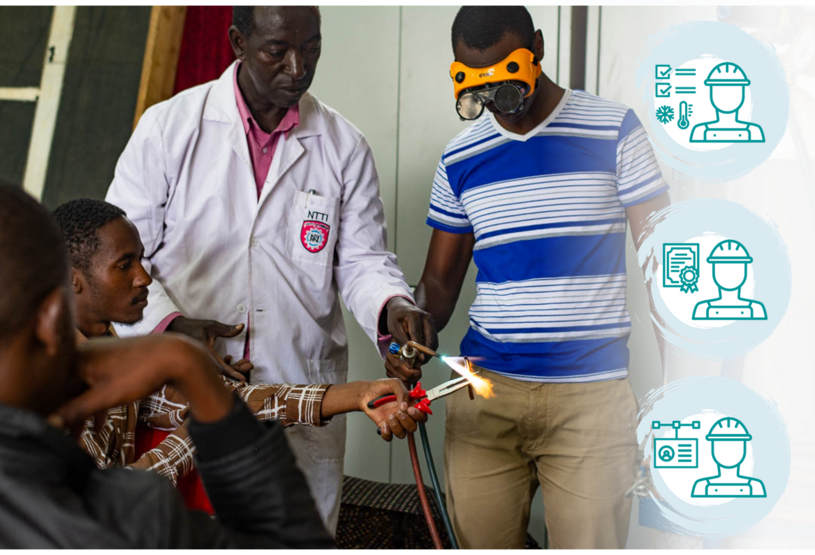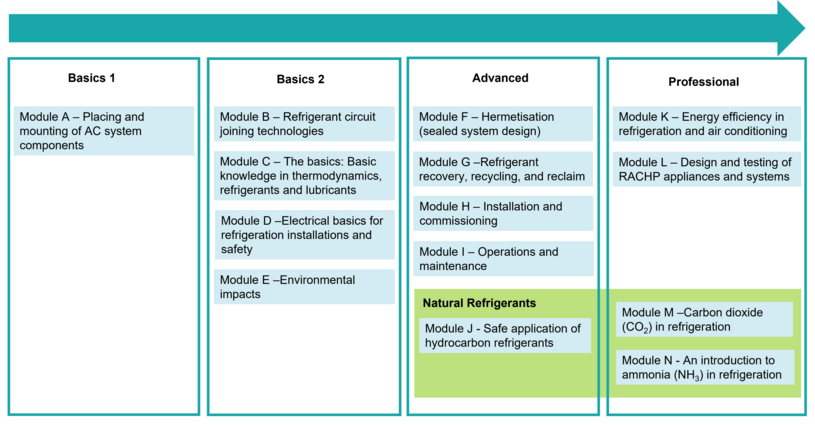Fit for Green Cooling
How to qualify, certify and register the RAC workforce of the future?

The number of cooling appliances is rising everywhere. Improper handling of cooling systems and refrigerants results in safety and health risks, increased energy consumption and negative impacts on the climate and the ozone layer. Highly skilled and experienced technicians are crucial to handle the growing number and variety of cooling appliances.
Sound qualification of refrigeration and air-conditioning technicians leads to protection of the environment, higher energy efficiency of the equipment and better occupational safety.
There are constant technical developments: towards higher system efficiency and more environmentally friendly refrigerants. Technical standards for product safety are changing, environmental regulations have to be met. The refrigeration and air conditioning sector is truly an exciting profession for lifelong learning.
Advantages of standardized skills
With standardized skills in the RAC sector it becomes easier to:
- comply with international environmental agreements, especially the Montreal Protocol and its Kigali Amendment
- integrate natural refrigerants
- save energy by ensuring efficiency of existing appliances
- and thereby achieve lower emissions and substantially contribute to long-term climate strategies towards zero-carbon cooling and a net-zero emission economy
- improve work conditions and income possibilities for technicians
Over decades, Proklima has gained valuable experience in assisting countries to set up an effective system for (1) qualification, (2) certification and (3) registration (short: QCR) of RAC technicians.
3 steps to success: qualification, certification and registration
Step 1: Qualification
Qualification
At GIZ Proklima, we believe that qualification in the RAC sector is the key to success. It is the key to a transition away from ozone-depleting and powerful global warming gases and towards the safe and efficient application of natural refrigerants, the most environmentally friendly of all; or to put it simply: the key to Green Cooling. Proper qualification of RAC technicians minimises environmental and health-related risks, increases energy-efficiency and ensures the creation of a future-oriented workforce.
To ensure proper qualification of a RAC work force the national framework should entail:
- defined qualification levels
- corresponding curricula and syllabi that reflect both international best practices and standards as well as the needs and specificities of a local market
- defined entry levels for courses
- the requirement for students to undertake both practical and theoretic training
Proklima’s Fit for Green Cooling approach is based on modular training: The basic training (basic refrigeration, safe handling, placing and mounting) is followed by additional modules for higher skill levels (up to leading edge, design issues, chillers etc.). All training modules consist of a combination of theoretical and practical lessons.
Step 2: Certification
Certification
An examination-based certification system standardizes the skills of RAC technicians and guarantees to consumers that the technicians have obtained the necessary knowledge and skills.
In an established certification system, technicians who successfully passed an official examination obtain their certificate. These certificates are issued by official certifying institutions as proof of competence.
In the RAC sector it is essential that technicians are skilled and knowledgeable enough to safely conduct – among other things – the installation, testing, commissioning, operation of RAC systems and appliances, including tightness control, servicing, inspection and planned preventive maintenance. At end-of-life, they need to safely put systems out of operation as well as conduct recovery, recycling, reclamation and disposal of refrigerants.
Step 3: Registration
Registration
With a central database where all certified RAC technicians are registered, even more added value is created: Companies and operators can easily identify qualified and certified technicians. The database can perform additional functions and, for example, also identify technicians whose certification is about to expire.
What is "Fit for Green Cooling"?
This video is being blocked because of your cookie settings.
To that end, Proklima developed “Fit for Green Cooling”: a holistic approach which was designed according to international standards but can be adapted to national contexts and integrated in country-specific structures. Its scope covers natural refrigerants and helps reduce direct and indirect emissions over the lifetime and disposal of RAC appliances by setting standards that are followed by a skilled workforce. It thereby supports countries directly in their efforts to phase down climate-damaging HFCs.
Fit for Green Cooling: Guidance, concepts and training materials
Proklima assists you and your country to establish a solid qualification, certification and registration framework. For project partners, Proklima offers comprehensive training guides on topics ranging from refrigeration basics to the design of complex RAC systems. Our aim is to support the further development or establishment of a system that is country-specific and self-sustaining in the long term.
14 modules

The training consists of 14 modules with theoretical and practical training sessions. The training institute receives trainer manuals for conducting the course and the practical exercises, supplementary material including a handbook and power point presentations for each chapter, an overview on skills to assess, module handouts and assessment questions.
Log-in to get full access to the Fit for Green Cooling materials
User login
Enter your username and password here in order to log in on the website
